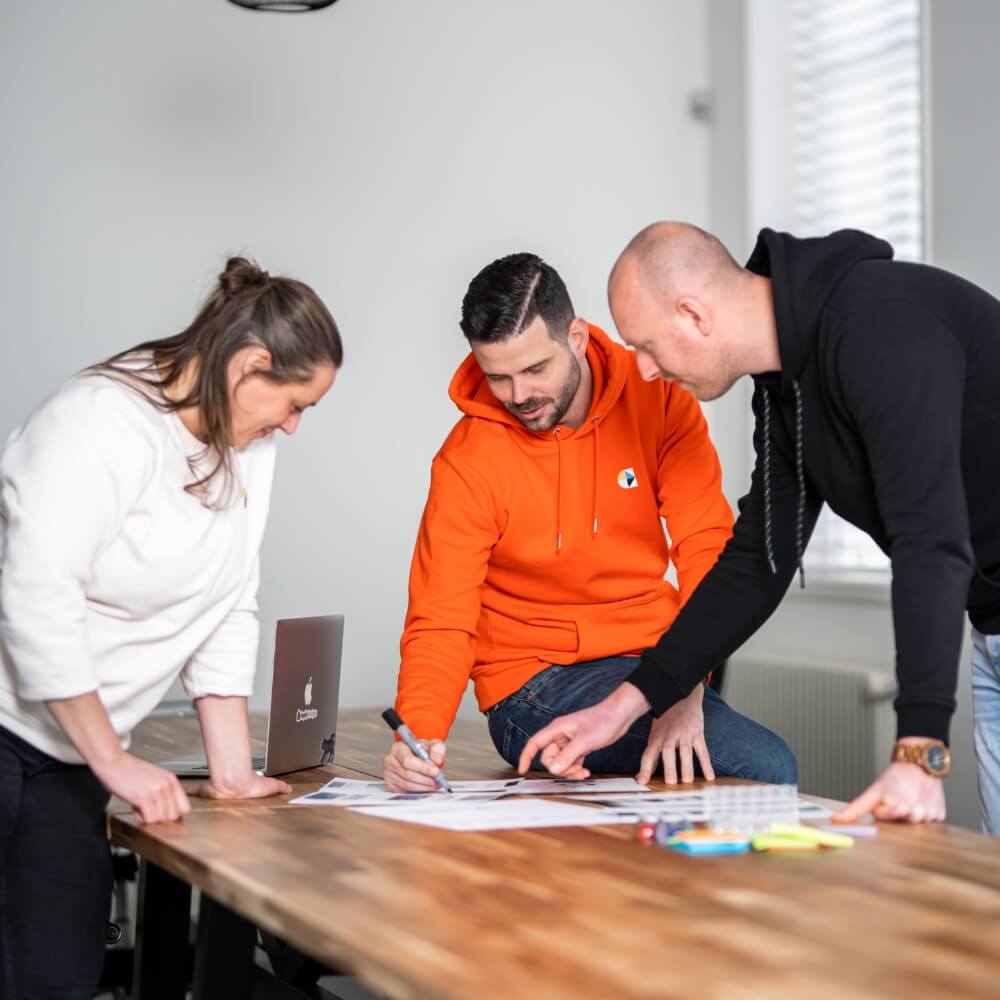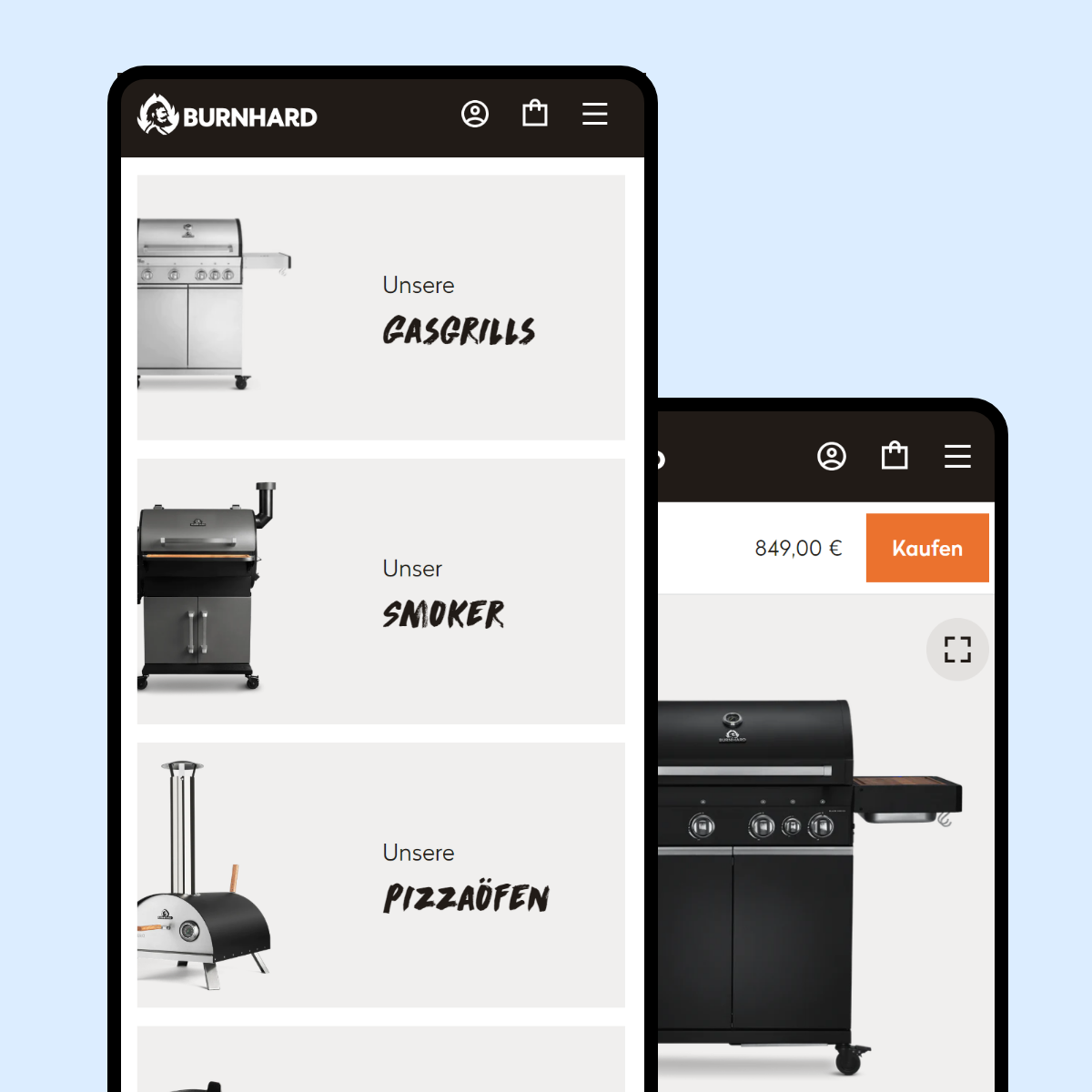Preliminary assessment
Before we do anything else, our team will go through your requirements to:
- Determine if Shopify is really what you need;
- Estimate the time needed for the first phase of the project: the discovery;
- Present you with a ballpark estimate for the full project.
In some cases, we set up an assessment call with one of our Solution Engineers. This takes about an hour. If we think Shopify and Code are a good match for your project, and if you agree to our proposal, we’ll move on to the next step.
Before we do this, it might be useful for you to have a look at your contracts with current suppliers to see when they expire or when you can discontinue them. This is also the right time to appoint an e-commerce manager or project manager for the migration to Shopify.
Would you like to continue reading about preparing for a migration to Shopify? Shopify’s team wrote an excellent replatforming guide that covers some topics we won’t discuss in this article.


Discovery
This is where we have an in-depth look at your current set-up, as well as your wishes for the future, to determine what the biggest challenges and potential bottlenecks of your Shopify migration project are. Based on our assessment, we will estimate how much time we will need for the project - hence, tell you a lot more about planning and cost. At the end of the discovery, we will know how many sprints we need, when those sprints will take place, and what important deadlines we can commit to.
Why is this such an important step? Because, just like you, we don't like being faced with unpleasant surprises halfway through a project. Not only can the project then get out of hand in terms of cost and schedule, but it doesn't make our customers happy - which is our most important mission. You understand: we pull out all the stops to avoid this. The discovery is a solid basis for a predictable migration to Shopify (MVP) and a great way to determine your growth ambitions so we can create a future roadmap together.
Raymond Weijers - e-commerce specialist at Le Nouveau Chef: “The Discovery was wonderful, it took away a lot of our worries and cleared up any uncertainties we still had.”
A note on Code’s Agile approach
Before we dive into the details of the Discovery, it’s good to know that we work Agile. This means we invest your budget where it results in the most value - also when this means we need to recalibrate the project when we obtain new insights. In any case, we always set things up in such a way that it moves with Shopify, and it’s future-proof.
What we look at during the Discovery
1. Your current data-structure
More often than not, our clients need to migrate a lot of data: customers, products and orders. You could consider starting on your new platform with a clean slate, but for most merchants, there is a solid reason why they need to move their entire order history to the new platform - when they offer their customers warranties, for instance, or when they use a loyalty program.
Data migration is a big deal. What’s more, the data has to be converted to fit Shopify’s data structure - which differs from that of other platforms. To speed up the data-migration process a bit we often use a tool called Matrixify. This works wonderfully well with Excel. Recommended!
2. Apps and integrations
What other systems is your business using? And do they play well with Shopify? We will seek to integrate Shopify with your whole tech stack in order to make things work smoothly for your business.If you’re using ERP software, for instance, can it be connected with Shopify or might you consider switching to another, more compatible ERP while you’re at it? If so, this has consequences for the planning.
Or if you’re offering subscriptions to your customers, can they be imported to Shopify or do you need to ask customers to renew any SEPA Direct Debit Mandates? Again: these things take time and will have to be taken into consideration when scheduling the project.
Code will take care to assess your current setup and see how it can be done in Shopify. What third-party functionality are you currently using, and does it work with Shopify or do we have to find good alternatives?
3. SEO redirects
Obviously, SEO is a big deal in e-commerce, and you don’t want to lose any traction in search engines because of your platform switch. During the discovery phase, we make a plan to redirect all URLs from the old situation to the new one. The actual redirection happens just before we launch your new store.
Usually, what happens SEO-wise after a store migrates is this: immediately after launch there is a dip in traffic, but soon Shopify will gain momentum and outperform the old platform. For this reason, we advise you to plan the launch at a relatively quiet time, when it won’t interfere with lucrative times like Black Friday.
4. Design
A platform migration is an ideal opportunity to also reconsider and/or refresh your branding. If you’re asking us to build a pixel-perfect storefront, you might as well hand us a new and improved design to work from.
At Code, we often refer replatforming clients to one of our design partners like Bolden. Our teams work very well together, which will also help us plan realistically. That way the rebranding project won’t slow down or delay the migration project. Do you have your own design partner you'd like to work with? That too is possible.
-1.png?width=2000&name=Migratieblog%20ENG%20(1)-1.png)
In case of a no-go
Sometimes the outcome of the discovery might be that your current set-up has key features that cannot be done in Shopify. In that case, we will give you some good advice on where to go next, hand you all the knowledge and experience we already shared with you about your business, and send you on your way to find a more suitable platform.
Build
If the discovery yields a green light, we can start building! We’ll start with the hard stuff, like product pages and collections, and then gradually move through the list of other tasks:
Front-end design: turn your design into a Shopify storefront, setting up collections, navigation, product pages and other pages
Data migration: customers, products and orders
Settings: take care of payment methods, shipping rules, tax rates and currencies
Backend development: installing apps and working on integrations with e.g. ERP, POS, fulfilment partner
Testing for launch: we always plan a ‘dress rehearsal’ for importing data. We make a script and test it, so we know it will work during pre-launch.
Pre-launch and launch
During the pre-launch phase we will check if everything is ready and take care of all the final touches before going live. Some of the things we do in this phase we already tested out earlier, to make sure it runs smoothly:
- Import all the order data that’s gathered on your old platform during the migration project, according to the script we made and tested during the building phase.
- Redirect SEO, according to the plan we made during the discovery phase.
For the actual launch, we always try to find a smart day. We obviously steer clear of Black Friday, or the day a new collection drops, or the start of a new season, and find a relatively quiet month to make the switch. On this day we test some key functionality when the new site is live, like the checkout, email notifications, and if the data needed for reports in your Shopify dashboard is coming in correctly. After that, your new and improved online store is ready to soar!
Download our migration e-book and learn more about migrating to Shopify.
.webp?width=1750&name=TheCreatorsHub-CODE-02478%20(1).webp)
.webp?height=2000&name=TheCreatorsHub-CODE-02879%20(1).webp)



